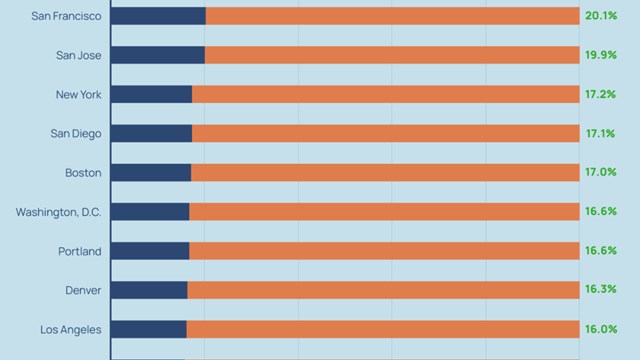You live in a condo, and the building has come of age. The facade needs a little work here and there, and
the windows should be replaced. Up until recently you would have had only three optionsall of which were sure to be unpopular with unit owners. You could dig into the reserve fund, raise the common charges or tack on a special assessment to the unit owners.
Condominiums are restricted by law from taking underlying mortgages, the traditional source of funding used in co-ops. But on August 28 condos got the long-awaited relief they have been seeking. Governor George Pataki signed into law an amendment to the 1964 Condominium Act that now allows condominium boards to seek loans from financial institutions.
It's the Law
The Condo Loan Law provides assistance to condo buildings that need to borrow funds for capital improvements by permitting lenders to secure loans through liens on common charges in the event of default. The legislation protects unit owners through safe harbor provisions, allowing them to amend condo by-laws to prohibit such borrowing, limit the per-unit borrowing to a total of $5,000 and/or delay borrowing under this section until five years after the first conversion of a condominium unit. If the amount exceeds $5,000 per unit, the debt must be approved by a majority of the unit owners. The law is designed so that a unit owner's share of the debt would be less burdensome than a direct assessment.
Passing the long-awaited amendment to the Condominium Act was not an easy feat. New York has been one of the few states that prohibited banks from lending to condos while other states have well-developed financing options. The law was originally passed by both houses of the New York State legislature at the end of July, but was later vetoed by the Governor. The original version allowed borrowing of up to $50,000 without unit-owner approval. The Governor thought this amount was too high and vetoed the bill. After lobbying efforts by the Council of New York Cooperatives (CNYC), a compromise was made that included the aforementioned safe harbor provisions and Governor Pataki signed the bill into law.
It forces the board to have a meeting and a discussion with the unit owners and to have the majority approve it, says Robert Friedman, president of Penmark Services, a lending institution based in Manhattan. This is the way it should be. Without this statute, the condo board could have done it anyway, but this puts the seal of approval on these types of loans, says Friedman. It says to the lending community that it is a very viable loan to make; that these are loans that should be looked at very carefully by lenders.
Making Timely Improvements
According to Edward Howe, vice president of National Cooperative Bank's (NCB) New York Team, prior to the amendment, a condo association was forced to postpone improvement projects until the reserve fund had been built up enough to pay for it. In order to accomplish this, common charges were raised or special assessments were charged to each unit, sometimes equaling thousands of dollars. Depending on the cost of the improvement, the reserve fund would often be left nearly empty, putting the building in a dire situation if another emergency occurred requiring another large expenditure.
Before, buildings would have to save up the money and hope t ffb hey had enough before the roof caved in, explains Paul Abelow, a partner with TAPCO Financial Services, a financing company located on Long Island. Now they can take care of the improvements in a timely fashion without severely hurting their pocketbooks.
The assessment issue was of major concern in the writing of the new legislation and is singled out as a main reason why the Condominium Act was changed. Assessments can be made for amounts that many unit owners simply cannot afford and don't anticipate. If a number of unit owners are unable to pay, the work cannot be done, potentially leading to undesirable, or even dangerous, conditions and decreasing the value of the entire building. That is why in the long run this law is good because it will increase the interest in condos, states David Zweig, director of management at Manhattan-based Lawrence Properties.
Expanded Options
This is overdue, adds Zweig. Historically, condos have not had a lot at their disposal. It will take a while to filter in, but I think it will be well received. Donald Rosenzweig, board president of his 245-unit co-op on East 57th Street, adds, For run-of-the-mill situations, I wouldn't go to a bank. For a major expense, though, my leaning would be to finance some or all of the cost because it allows us to amortize it over a number of years and maintain a reasonable reserve fund. It's a very good idea. Our options were extremely limited and now we feel more in control of protecting our reserve and continuing to build it up for needs other than large capital projects.
It is being well received, Howe concurs. Condos have the same problems as co-opstheir roofs go, their windows need to be replaced and they need facade work. Now they are able to obtain the lending. NCB is expecting to close loans in December and more in early 1998.
According to Robert Friedman of Penmark, The popularity of this amendment won't happen overnight, but we are now in the process of closing three loans and are expecting more as the word spreads about this law.
David Kuperberg, president of Cooper Square Realty, a property management firm located in Manhattan, thinks every condo should consider the new financing option, although he warns that there are certain things the building should look at before they take the plunge. Every building has to consider their individual circumstances, he points out. One of his firm's client buildings, Beekman East, decided not to take advantage of the new financial opportunity when they needed money. In that particular building, the calculations did not work out on the side of taking a loan, Kuperberg explains. The costs of closing and obtaining the loan would be too large proportionally to the amount they were looking to borrow. When you are approaching the $5,000-per-unit mark, this is where it pays to borrow the money.
Ms. Cooper is Editorial/Internet Coordinator of The Cooperator.







3 Comments
Leave a Comment